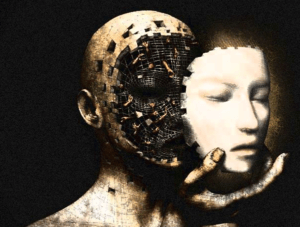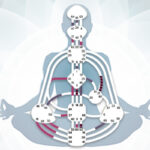In Human Design, there is such a concept as the False Self. And sometimes in our life takes place fighting False Self. So what is False Self? It literally means the process of suppressing your personality, when the impossibility of fulfilling your own desires or other factors literally reshapes you, transforming you into a completely different person. Millions of people live their lives under the yoke of the False Self without even thinking about it. Deep down, they feel that they are deeply unhappy, but they cannot admit it to themselves. After all, this will mean that they are doing something wrong, and the person is painfully afraid of his own mistakes. But no matter how scary or difficult, everyone should learn about their weaknesses. And in this regard, the False Self can be called our concentrated weakness, the place where all our fears and complexes converge.
The false Self is an evolved herd instinct, when patterns imposed by someone else are perceived as the only possible truth. It is your mind’s way of adjusting to the realities around you so that you think, feel, and act like everyone else. This is the tendency to sacrifice one’s own desires in order not to stand out from the rest of the crowd. It forces you to follow false ideals, and it is no wonder that the attainment of such false desires does not bring any satisfaction.
To fight the False Self, first of all, you need to learn to notice how and when exactly it manifests itself. As long as you deny or close your eyes to the problem, you are not an inch closer to solving it. And even if now you live in full accordance with your nature, it is not a fact that you will not be influenced by the False Self later. Therefore, it is so important to study your “enemy” in advance in order to be ready to confront him at the right time.
Each person at a certain period of his life faces a choice: to remain himself no matter what, or to allow external pressure to dictate what he should be. Follow your true aspirations or try to fit into the overall “picture” of society. To love and respect your real self, or to cultivate in yourself a False Self, ignoring your own desires. Despite the obviousness of this choice, most people still prefer to succumb to the influence of the False Self.

The circumstances leading to the loss of your personality can be very different. Someone from childhood was brought up “out of the stick,” and he just got used to sacrifice his own interests for the sake of the interests of his parents. Someone considers their own hobbies too “strange” and is afraid of ridicule from society and people close to him. And others simply do not think about the questions about their happiness – living their lives as if by inertia, they do not experience either joy or inner harmony. Most use the “template” hoping to find satisfaction in it. But only stress and discomfort in the soul are their constant companions.
And it doesn’t matter what kind of person you are, what you do, or what you believe in. You cannot find the strength to be happy until you understand what exactly can make you happy. Chasing ideals and dreams imposed from the outside, in the stream of life, you may suddenly miss something very important for yourself, chasing something that you don’t care about. But the science of Human Design can help you find your creative path. You can stop looking at your life through the prism of public opinion and generally accepted standards, learning to accept your own uniqueness with all the ensuing consequences.
But this is not so easy to achieve. The false Self is a role that we adhere to under the influence of certain circumstances, over time this role becomes an unconscious part of our personality. And the longer we live under the yoke of the False Self, the more firmly this image sticks into consciousness and becomes true. This can be compared to an addiction, which is difficult to get rid of, but necessary. Because the desire to associate yourself with what you are not really will lead you only to the fulfillment of other people’s desires and hopes, which do not bring you any emotional satisfaction. It’s as if you have devoted your whole life to studying banking while your soul gravitates towards raising children. Even after decades, you will not be able to bring yourself to love something that you are not interested in, no matter how hard you try.
The false “I” is the tendency of the mind to put itself at the head of our personality, to ascribe to itself the power over our creative “I”. This is the habit of considering the image in which you perceive yourself to be the real embodiment of your personality. In fact, the mental prototype is nothing more than an illusion, developed and brought up by the mind. Each of us loves to ascribe to ourselves those traits and qualities that we would only like to have. Images of heroes from movies or TV series, friends, or just acquaintances – in each of those around us we see positive traits that we would like to “get” for ourselves. And all the qualities that are present in us, but cause our dissatisfaction, on the contrary, we try to remove them away so as not to disturb ourselves once again. And even if close people try to draw our attention to these manifestations of personality, then we immediately perceive it with hostility, taking a defensive position. So we live – in a cycle of constant self-deception, not appreciating what we have, envying other people’s merits. The Human Design System offers a solution to this problem.
The true embodiment of each person lies much deeper than the limited framework of consciousness. The mind will be ready to kindly provide you with dozens of “balanced” reasons why it is necessary to act this way, but not otherwise. But happiness, harmony, and peace of mind have nothing to do with the cognitive process. Try to remember when you were most happy. When did you follow the voice of reason, or when did you act based on inner sensations? The real joy of life can manifest itself only in spite of the work of the mind, but in no way due to it. Thoughts give rise to thoughts, feelings give rise to feelings. So stop THINKING about how to find yourself and follow your FEELINGS.
According to Human Design, each person has a set of “basic” traits and characteristics that constitute the foundation of his personality. They are indicated in the Bodygraph – these are specific centers, marked with filled areas. There are also undefined centers open to conditioning from the outside – this is the basis of the Self of the False. If a person does not adhere to the Strategy and Authority intended for him, then the scales tilt towards the False Self, and he ceases to follow the path destined for him, slipping into social “traps”.
To be clear, Authority is an internal compass that points you in the right direction for making decisions. Each person has his own Authority, according to the advice of which his life should be built. This is your “self” in its purest form – incapable of dialogue in “human” language, it, nevertheless, has completely different methods for self-expression. Your task is to find a way to communicate with your Authority, learn to listen to it and trust it.
Strategy is a behavioral complex formed according to your Type. There are 4 + 1 Types in total, each of which has its own distinct Strategy. Ultimately, it is simply a way to surrender to yourself, surrender to the flow of life, and let your Authority guide you.
Manifestora’s False Self – Anger
First, let’s see what the classic Manifestoors are. They are self-sufficient, independent individuals, always relying solely on their own opinion. They contain the imperious energy inherent in leaders of all stripes. Manifestors have the strength and determination to bring all their ideas to life, no matter how unattainable they may seem. This is the Type of people who never accept someone else’s interference in their plans, and always act in their own way. They worry about their own good (or about people close to them) and do not allow anyone to get in their way.

This is a rough description of an ordinary Manifestoor who follows his nature. The first manifestations of the Manifestor side of character are noticeable from a very early age. Such children almost never ask their parents for permission, they constantly do whatever comes into their heads. They do not ask questions about what they can and cannot, striving to do whatever they want. They do not need other people’s advice and opinions – they want to gain their own experience, following their desires. And of course, such an anarchist position rarely meets with the approval of the child’s parents.
Child-Manifestors are always eager to shackle them into the shackles of control. They are watched twice as diligently as other children, they are punished twice as much, and they are judged twice as severely. Moreover, even when there may not be adequate grounds for sanctions. It’s all the fault of the parents’ desire for control, who simply cannot allow their children to do what they want. Adults are always firmly convinced that they know how to live “correctly” and try to forcibly impart this knowledge to the younger generation. And for the child-Manifestoor, such control becomes a real torture, because blindly obeying someone else’s instructions is contrary to his nature, but he cannot oppose his parents either. He has to carry these feelings within himself, and as soon as he begins to gain independence, he no longer allows anyone to dictate to others what to do and how.
To one degree or another, each person does not like to obey other people’s orders, especially if they go against his own opinion. But the Manifestors, under the influence of the False Self, have developed such anarchism to the limit, and every attempt to interfere in their lives causes serious opposition. Having endured control from their parents since childhood, Manifestora are ready to abandon any connections with people if they meddle in their lives. And every attempt to interfere or at least suspend, they meet with hostility, ready to adhere to their self-sufficiency to the end.
The Manifestor’s anger is a side reaction of their exaggerated independence. They dislike control so much that they prefer not to tell others about their plans at all, fearing that they will be stopped or delayed. Therefore, in most situations, Manifestors are more likely to immediately do their plans, without explaining their ideas to anyone. But in an attempt to escape control, they are faced with the fact that control only increases. The people around them may simply not understand why and why the Manifesto does something, and what consequences all this can lead to. And often Manifestors are put in such a situation that they are forbidden to continue doing what they have planned until they explain the meaning of what they started.
As a result: a vicious circle, when attempts to get rid of control become only an excuse for increased control. And the more “independent” the Manifestoor wants to be, the more obstacles he will meet on his way, the more anger and anger there will be in his life. Manifestoors need to learn to pacify their pride and begin to devote those around them to their plans. This is not at all about asking permission. If a Manifestoor wants to change jobs, he just has to come up and tell his boss: “I’m going to quit on such and such a date for such and such a reason.” Then, having explained the situation, he will be able to leave work peacefully, without conflicts or disputes. But if he just comes up to his superiors with a statement and says: “Sign”, then he will surely have to enter into a confrontation.
But there is another side of the Manifestor’s False Self. Usually, when this Type is considered, its ability to initiate is always mentioned. That is, he can do whatever comes into his head, and he will always have an excess of energy to implement his plans. However, excessive control in the early years can literally “break” the Manifestora’s character, turning him into a weak-willed and fearful person who is afraid to start doing anything. When, instead of holding fate in his own hands, he deliberately gives his life to chance, hoping for a favorable outcome. This is a deeply rooted thought that any of his actions will necessarily be followed by a prohibition or punishment. Such a pattern can be so deeply embedded in the head that it will manifest itself even unconsciously.
It is much more difficult for such Manifestoors to awaken their true nature, but it is still possible to do it. You just need to start trusting your inner Authority, and he will always prompt the right decision. This is a long experiment in your own life, which will require tremendous determination.
The Generator’s False Self – Frustration
Who are Generators? These are people who must follow the voice of their inner “I” – the Response. It is a versatile decision-making assistant that will always prompt the right choice. He can be called the herald of the true “I” of the person – he is tuned exclusively for the good of his owner and will never give advice that will cause harm. The response is an organ that responds to external circumstances. That is, he expresses his voice only as a reaction to some stimulus. Most often, it manifests itself in the form of an unambiguous answer to a question, which can be answered “yes” or “no”. All kinds of “uh-huh”, “aha”, “nope”, “u-u” – this is the voice of the Response, demonstrating the genuine attitude of the Generator to a particular issue or occupation. And so, the Generators follow their Response through life. Without initiating anything on your own, they only react to the opportunities that fate presents to them. All that Generators need to be happy is patience and courage to trust the will of chance, without trying to take tight control over life into their own hands.

The false “I” of the Generator is frustration. This is a reaction that comes as “payback” for ignoring one’s nature and life in spite of oneself. Of great importance in the development of a false personality is not only parents, but the whole society as a whole. “Time is money” – this is one of the most relevant modern sayings. That is, if you want to succeed in life, then you must always make decisions quickly, using every opportunity. And oddly enough, this completely contradicts how Generators should behave.
As a result, many Generators try to try on the image of the Manifestor. They take control of life into their own hands, do what they see fit. They strive to initiate themselves, instead of responding to what fate presents them. And no matter how correct this approach may seem in modern society, you need to understand that all people are different, and someone simply cannot cope with such a rhythm of life. Likewise, the Generators, not having enough internal strength and energy to implement each idea, are forced to exist in constant frustration from the impossibility of putting them into practice. They convince themselves that they can and should do whatever comes to their mind. But the mind is a bad advisor, and that’s why so many Generators completely lose themselves in the hectic daily life. Instead of stopping and trying to feel
And the less this approach brings success, the stronger the frustration and anxiety in the soul of the Generator. He begins to look for reasons in himself and convinces himself of the thought that he is simply not adapted for life, that any of his actions are doomed to failure in advance. He again and again continues to act under the influence of his mind and False Self, but not with enthusiasm, but with a sense of detachment, as if knowing a priori how it will end. Here there is a syndrome of learned helplessness, when repeated defeats can completely discourage any will to win, and a person will simply exist, forgetting how to live.
It’s hard enough to convince someone that in order to find harmony, he needs to “surrender” to his fate. Just go with the flow and watch which harbor it brings. Do not try to show excessive responsibility, but let fate lead you through life. Not initiating, but only reacting to all turns of the wheel of fortune. This is the path that will inevitably lead any Generator to a sense of inner peace, when he is firmly convinced that he is going his own way.
The top tip for all Generators is to stop thinking of yourself as someone you are not. Don’t look for a “model” or “idol” for your life. You are as you are, as you were born. Accept that other people can be better than you at something, but don’t let that fact provoke you. Follow your true nature regardless of anyone else. And then sooner or later you will feel that you have stepped on the right path, and you will forget about frustration.
Projector’s False Self – Bitterness
The main feature of Projectors is that they are able to recognize and develop other people’s talents and abilities. Like professional trainers, they immediately see the potential in other people and can accurately determine how this potential can be developed. Projectors’ strategy is to wait for an invitation. That is, the moment when their mentoring qualities will be noticed and recognized by the people around them, when they will be needed. Only then will the Projector be able to take full advantage of its talents and direct others in the right direction. If the Projector itself tries to “impose” on someone, then most often this leads to its rejection, which becomes a reason for bitterness.
So, the False “I” of the Projector is directly related to his true desire – to be recognized by other people. Realizing from childhood that he cannot keep up with purposeful Manifestoors or hard-working Generators, the Projector begins to feel envy of others and self-pity. He downplays any of his merits, referring to the fact that the people around him are doing much better. This is the stage that almost every projector faces. It is these inner experiences that make him subsequently begin to think about what kind of abilities he actually has. It is only when the Projector assumes its outside position in the race of life that it can first see things from a completely different position. He will learn to consider any events not from the side of a potential participant, but as
This is the first step towards becoming a Projector. After it, real difficulties begin when the False Self is first manifested. Projectors are naturally very mentally gifted people who differ from others in their flexible and non-standard way of thinking. Their talent for seeing the situation can be expressed in a variety of areas and areas. They understand better than the people around them how to do something and how not to do it, what details should be paid attention to, and what should be ignored. But until their talent is recognized, it will be of no use.

Bitterness is a feeling when the Projector with all its soul wants to help other people to do something, but its help is not needed. This feeling reminds him of his own weaknesses and shortcomings, that he can never be equal to others. These are dashed hopes that at least in something he can be really good, that there is an occupation in which he is the best. Bitterness is the scourge of all impatient Projectors who literally run to people shouting: “Take me with you! I will be useful to you! ”. Of course, such a servile attitude is rarely found positive.
Under the rule of the False Self, the Projector allows its inner resentment and envy to take over. He tries to forcibly “sell” his services to other people, convincing them that they are doing wrong and only he alone knows how to do it right. Such an aggressive position inevitably meets only opposition from others, and even in those situations when the skills of the Projector are really recognized. As if protecting itself from excessive pressure, society tries to protect itself from such a Projector, not allowing it to participate in what it wants.
You can call this a limitation that prevents the Projectors from wasting their energy on everything. Until he is invited (Strategy is to wait for an invitation), he will not be able to effectively lead other people. But as soon as he receives the desired invitation, when those around him allow the Projector to guide them, then he will not feel discomfort within himself. He will be able to fully fulfill his mission without fear of rejection from people.
Reflector’s False Self – Disappointment
Reflectors are the most unique and rare Type among the other Types. They can be anyone, while still being themselves. As specialists in interpersonal relations, they easily “read” the atmosphere prevailing in a given situation, in a particular team. Reflectors see right through other people, sometimes noticing such manifestations of other people’s personalities that people cannot notice in themselves. Reflectors have to face disappointment all their lives – passing through themselves the images of the people around them, they form an opinion about their own insignificance, nondescriptness. Therefore, they try to take the image of another person for themselves, becoming its full copy. But alas, the Reflectors do not have enough energy to stay in someone else’s guise for a long time, and they are disappointed with themselves with renewed vigor.
What can be said about the nature of the False Self of this Type. As in other cases, the first inclinations of the formation of the False “I” begin in Reflectors from childhood. They are in constant indecision and doubt about what they want and who they want to be in life. From an early age it is very difficult for them to understand themselves, their motives and desires, the reasons for their thoughts and actions. Today they are convinced of one thing, but tomorrow they may adopt a completely different point of view. And all this happens without any internal conflicts of inconsistency, as if in a day they turn into a completely different person.
Reflectors are true masters of transformation. Like chameleons, they change the color of their personality, attuning it to the society in which they are. Hence the fact that the Reflectors are rather indecisive about themselves and their decisions. Because as soon as they find themselves in a new environment for themselves, they unconsciously adjust to it. These are amazing transformations that affect not only what the Reflector says, but also his behavior, his character and even his way of thinking. And in all the diversity of what comes into him from the outside, it is very difficult for the Reflector to find something stable in himself, something that he could call with full confidence exclusively his own.

This Type is called so for a reason. He really reflects or reflects what falls on him. Other people’s thoughts, behavior, habits, style of speech. On the one hand, it should be used for good. Getting into the company of cheerful, cheerful and energetic people, the Reflector himself becomes the same person filled with life. But this is also the curse of the Reflectors. The more “bright” people interact with them, the more they become attached to someone else’s energy, and the more painful it can be to part with it. And sometimes some representatives of this Type can get so used to a certain image of a person that they no longer want to let him go. They strive to make it their own, to try once and for all to get used to this role, discarding others. But alas, here Reflector will inevitably be disappointed.
Without going deep into the auras and energetic interaction of people, I will only say that the Reflectors do not have their own energy. They are pure coloring, which is painted in the colors of the personality of the people around them. As long as the Reflector is in the company of someone, he has direct access to this energy. But as soon as they move away from each other, the Reflector again takes on the image of an empty “vessel” that needs to be filled. And there are no prerequisites for the Reflector to be able to preserve the once tested image. This is one of the reasons for the eternal disappointment of the Reflector.
Another reason is that the Reflector, having tested on itself many images of other people, may be disappointed in itself. He will begin to consider himself absolutely “no” person, devoid of any manifestations, both positive and negative. Natural frustration has nothing to do with negativity. This is simply a discrepancy between the desired and the actual, and nothing more. Such a Type – Reflectors, their even the manifestation of the False “I” does not apply to either light or dark qualities. It is inertia that manifests itself in every aspect of the personality.
But Reflectors have not only the most contradictory manifestation of the False Self, but also the greatest potential. After all, their role in this world is to be observers of the events taking place. Changing people in their circle, they live many lives, “taste” the existence of tens and hundreds of people. Reflectors are a treasure trove of wisdom and knowledge of what it is like to be human. All that is needed for representatives of this Type is to accept their unique nature and allow Strategy and Authority to lead their lives.
Manifesting Generator False Self – Impatience
The Manifest Generator is a symbiosis of the classic manifestation of the Manifesto and the Generator. The Manifesting Generator combines both positive and negative manifestations of both Types. As a Manifesto, he has the imperious energy to carry out his plans, and as a Generator he needs to seek “approval” from the Response from time to time, otherwise he risks getting bogged down in unpleasant affairs and worries. It is quite difficult for Manifesting Generators, because they have to find a balance between the contradictory manifestations of their personality. Hence the False “I” of this Type – impatience, when a person acts, relying only on one side of his “I”, ignoring the other.
Each Manifesting Generator is a fairly active and purposeful person. He is always immersed in business and strives to use every second effectively. Doing several things at the same time, he does not lose focus on any of them, devoting enough time and energy to everyone. This is a genus of hyperactive people who practically do not need rest, and who can cope with things better and faster than representatives of other Types.
It is worth remembering that the Manifest Generator is a mixture of the two Types. Therefore, in his life he can meet both the anger of the Manifestoor and the frustration of the Generator. Yet the main manifestation of the False Self in his case is impatience. Being a very fast and capable person in itself, the Manifesting Generator, however, cannot always cope with everything alone. And there are simply many situations when he will inevitably have to interact with other people, regardless of his attitude to this. This is where impatience manifests itself in all its glory.
What the Manifesting Generator can spend an hour on, other people will spend two, three, or even four hours. And the representative of this “impetuous” Type himself may sincerely not understand how it is possible to spend so much time on such a simple task. This gives rise to some arrogance and disdain for other people, the desire to do everything yourself simply because it is “faster”.

The Manifesting Generator always strives to embody any thought that comes to mind immediately, without delay or stopping. And therefore, from time to time, he forgets to listen to his Response, to find out his attitude to this. Having become too much accustomed to the fast-paced lifestyle, the Manifesting Generator may ignore its need to temporarily stop, listening to the reactions of its Response. Therefore, he takes on dozens of cases, starts them, and then leaves unfinished ones. Simply because in reality he did not want to do this, and now there is no energy and desire to finish what he started.
The Manifesting Generator, like no one else, needs to cultivate exceptional patience. He must not only understand that he has incredible energy, but also be able to use it correctly. There should always be a pause between active actions so that there is time to listen to your Response. Otherwise, the Manifesting Generator will get bogged down in unfinished business and unfulfilled promises.
Conclusion
Many people who start studying Human Design lose motivation over time. They expect that they just need to slightly change their usual way of life and everything will work out for them at once. However, I want you to understand – it won’t be easy. We are not just talking about small changes, but about something more global that will affect absolutely all aspects of your life. In fact, we are talking about “killing” your Ego-False Self and replacing it with your true embodiment. It is a long and painstaking transformation process that requires willpower. But if you manage to go through this path of deconditioning despite obstacles and difficulties, you will be reborn.
You will gain a connection with your transcendental “I”, go beyond the cognitive process of the Ego. It is a feeling as if you have gained something that was lost a long time ago, but nevertheless, is always present within you.
With best wishes.
A full decoding of your chart in pdf format is available here.




Can your False Self be manifested through your Defined Channels? Or should your focus be on your Undefined/Open Centers and Channels?
I am reading through a close friends chart and discovering that their channels do not seem to match them at all, while the false self of said channels are indeed matching with them.